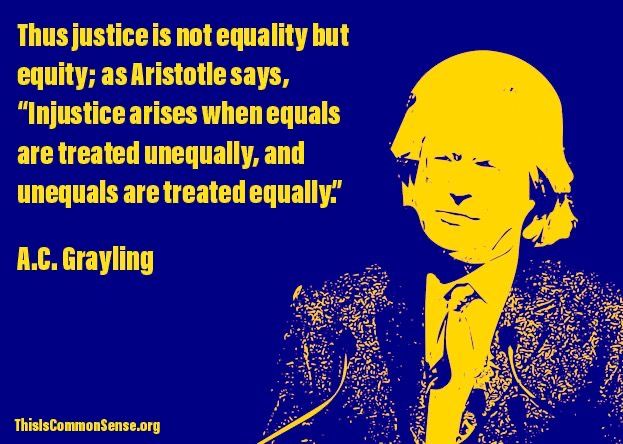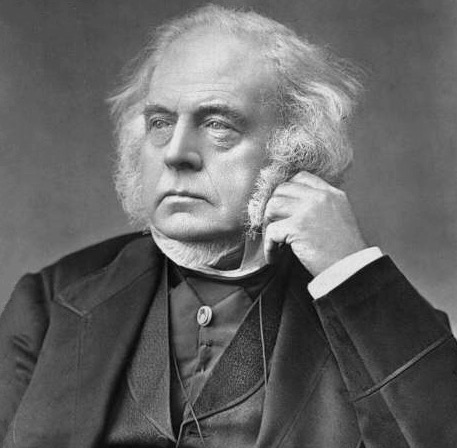Thus justice is not equality but equity; as Aristotle says, “Injustice arises when equals are treated unequally, and unequals are treated equally.”
A.C. Grayling, “Protest,” Life, Sex, and Ideas (2002).
A. C. Grayling


Thus justice is not equality but equity; as Aristotle says, “Injustice arises when equals are treated unequally, and unequals are treated equally.”
A.C. Grayling, “Protest,” Life, Sex, and Ideas (2002).

The times may not seem to indicate jubilations and thanksgivings, but any time is a good time to practice gratitude — to those who deserve it, and on a more basic level, too — so, regardless of the pandemic, the misguided responses, social unrest, racial mistrust, the threat of totalitarianism and war, remember: things could be worse.
At Thanksgiving, especially, it might do us good to consult William Bradford’s account* of the History of “Plimoth Plantation,” a document that recounts how his fellow Pilgrim settlers established, endured, barely survived, recovered, and eventually thrived in Massachusetts.
By the spring of 1623 — a little over three years after first settlement in Plymouth — things were going badly. Bradford writes of the tragic situation:
[M]any sould away their cloathes and bed coverings; others (so base were they) became servants to [the] Indeans, and would cutt them woode & fetch them water, for a cap full of corne; others fell to plaine stealing, both night & day, from [the] Indeans, of which they greevosly complained. In [the] end, they came to that misery, that some starved & dyed with could & hunger.
The problem? The colony had been engaging in something very like communism.
The experience that was had in this comone course and condition, tried sundrie years, and that amongst godly and sober men, may well evince the vanitie of that conceite of Platos & other ancients, applauded by some of later times; — that [the] taking away of propertie, and bringing in comunitie into a comone wealth, would make them happy and florishing; as if they were wiser then God.
Bradford relates the consequences of common property:
For this comunitie (so farr as it was) was found to breed much confusion & discontent, and retard much imploymet that would have been to their benefite and comforte. For [the] yong-men that were most able and fitte for labour & service did repine that they should spend their time & streingth to worke for other mens wives and children, with out any recompence. The strong, or man of parts, had no more in devission of victails & cloaths, then he that was weake and not able to doe a quarter [the] other could; this was thought injuestice. The aged and graver men to be ranked and equalised in labours, and victails, cloaths, &c., with [the] meaner & yonger sorte, thought it some indignite & disrespect unto them. And for mens wives to be commanded to doe servise for other men, as dresing their meate, washing their cloaths, &c., they deemd it a kind of slaverie, neither could many husbands well brooke it.
Yes, the s-word: Slavery. Common property was mutual slavery.
The solution? The plan for society that Bradford attributed to God. He brooked no pleading that common property didn’t work because of corruption, sin. As he put it, “seeing all men have this corruption in them, God in his wisdome saw another course fiter for them.” The course? I’ll use a word of coined by Robert Poole, one of the founders of Reason magazine: Privatization.
Basically, what the Pilgrims privatized was land, and the fruits thereof, assigning to
every family a parcell of land, according to the proportion of their number for that end, only for present use (but made no devission for inheritance), and ranged all boys & youth under some familie. This had very good success; for it made all hands very industrious, so as much more corne was planted then other waise would have bene by any means [the] Govror any other could use, and saved him a great deall of trouble, and gave farr better contente. The women now wente willingly into [the] feild, and tooke their litle-ons with them to set corne, which before would aledg weaknes, and inabilitie; whom to have compelled would have bene thought great tiranie and oppression.
Thus began the years of bounty in Massachusetts. There’s much more in Bradford’s account worth reading, including the increasingly tragic relations with the native Americans. And, indeed, one learns from reading such first-hand accounts how imperfect a creature is man.
But it is obvious that some systems of property and governance work better than others, and, on the day that our government has set forth as a day of Thanksgiving, it is worth being thankful for living in a land that has upheld — to at least some degree — the system of private property that America’s Pilgrim’s learned to see as God’s “fitter course” for corruptible man.
This is Common Sense. I’m Paul Jacob.
* This episode of Common Sense is adapted from this site’s 2011 Thanksgiving message.
—
See all recent commentary
(simplified and organized)

On November 16, 1532, Francisco Pizarro and his men captured Inca Emperor Atahualpa at the Battle of Cajamarca.
In 1811 on this date, John Bright (pictured above), English academic and politician, Chancellor of the Duchy of Lancaster, was born. Bright (d. 1889), famously worked with Richard Cobden against the Corn Laws (repealed in 1846) as well as for the Cobden–Chevalier Treaty of 1860, which ushered in freer trade and closer interdependence between Britain and France.

The secessionists won.
Last year, I reported on the seemingly quixotic attempt by rural Oregonians to divorce themselves, politically, from the cosmopolitan woke-crazies in Portland, Salem and Eugene by voting via initiative, county by county, to leave to form a “Greater Idaho” with the neighboring state. Well, those secesh ballots were cast on the 18th, and voters in Malheur, Sherman, Grant, Baker, and Lake counties “approved various measures that require county officials to take steps to look into moving the Idaho border west to incorporate the counties.”
The Epoch Times story, from which I learned the news, is oddly titled “Oregon Counties Vote to Secede Into Idaho.”
Well, one doesn’t secede into anything, one secedes from.
The plan is, after secession, to accede into Idaho.
The opposite concept of secession being accession.
Disgruntled rural Oregonians are begging their governments to allow a double maneuver: secede-then-accede.
The secessionists won the vote, but what happens next? The idea that the Democratic-controlled state government in Salem would allow this is a stretch. And though Idaho’s Republican governor hasn’t pooh-poohed the idea, no guarantee there, either. Plus, the deal would take congressional approval.
Still, the secede-accede strategy makes sense — political bodies are less kludgy if made up of somewhat like-minded people, not people who cannot stand each others’ guts. The sad truth of government today is that the malign intent of many is not “Divide and Conquer” but “Lump Us All Together and Glory in Making Our Opponents Pay and Pay and Pay for What They Hate.”
Arguably, this is driving us crazy.
And some to secession . . . and into new states.
This is Common Sense. I’m Paul Jacob.
—
See all recent commentary
(simplified and organized)

“Given China’s coverup of the outbreak in Wuhan, the WHO’s early praise for the country’s response and the fact that it took a full year to get a joint Chinese-international team on the ground for a brief visit,” explained The Washington Post, “the critical but challenging search for clues faced skepticism from the start.”
“Skepticism” is a kind reaction to the just-released World Health Organization report on the origin of COVID-19’s transmission to humans.
U.S. Secretary of State Antony Blinken informed CNN that “the government in Beijing apparently helped to write it.” Though “foreign scientists on the trip took pains to praise their Chinese counterparts,” The Post noted, “They also acknowledged the limits of working with data collected before they arrived that may or may not be complete.”
Reuters reported yesterday that “Data was withheld from World Health Organization investigators who travelled to China to research the origins of the coronavirus epidemic,” according to a statement from none other than WHO Director-General Tedros Adhanom Ghebreyesus.
Yet, even acknowledging that the WHO report is based on highly questionable and woefully incomplete data, our major media continue to amplify the message that it is “extremely unlikely” the virus passed to humans through a Wuhan lab.
So suggested a BBC story when international scientists went to China last month: “after visiting the Wuhan Institute of Virology, they have closed the lid on a controversial theory.”
Why controversial? It would place further blame on China.
The possibility of a lab accident was raised a year ago, including here, but the media has seemed incurious. Now, with the newly released report, the unlikeliness of a lab breach is again a theme.
But there has been no real investigation.
The Post points out that the scientists who visited “got a tour of the facility, heard about the lab’s rigorous safety protocols and were told the lab was not working with viruses close to SARS-CoV-2.”
Meanwhile, two new tidbits have emerged: (a) “One member of the team said in a post-trip television interview that researchers at the [Wuhan Institute for Virology] lab were sick in the fall of 2019,” and (b) the final WHO report disclosed that a different lab, the Wuhan Center for Disease Control, moved on Dec. 2, 2019.
“I still think the most likely etiology of this pathogen in Wuhan was from a laboratory,” Dr. Robert Redfield, a virologist and former CDC director, said over the weekend, “you know, escaped.”
It’s almost as if COVID-19’s origin is the one thing we’re not supposed to uncover.
This is Common Sense. I’m Paul Jacob.
—
See all recent commentary
(simplified and organized)
